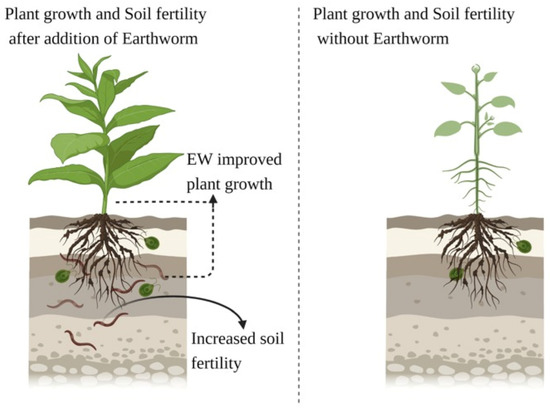Imagine transforming your garden or farm into a lush, thriving ecosystem with just a few wriggling creatures. Yes, earthworms—those small, humble organisms—hold the key to unlocking the true potential of your soil.
You might be surprised to learn how these natural soil engineers can dramatically boost productivity and health in your garden or agricultural land. By embracing the power of earthworms, you’re not just improving soil; you’re nurturing a foundation that supports everything from vibrant plants to bountiful harvests.
The best part? It’s a solution that’s as natural and sustainable as it gets. Curious about how these little creatures work their magic and how you can harness their power? Keep reading to discover the fascinating ways earthworms can be your secret weapon in creating a more productive, healthier soil. Prepare to dig into the world of earthworms and transform your soil like never before.

Benefits Of Earthworms In Soil
Earthworms boost soil productivity by breaking down organic matter, enhancing nutrient availability, and improving soil structure. Their tunnels allow air and water to reach plant roots, promoting healthier growth. These natural soil engineers increase fertility, supporting sustainable agriculture and vibrant ecosystems.
If you’re searching for a natural way to boost your garden’s productivity, earthworms might just be your secret weapon. These humble creatures do wonders for the soil, enhancing its fertility and structure. Let’s explore the specific benefits earthworms bring to soil and how they can transform your gardening experience.Enhancing Soil Structure
Earthworms burrow through the soil, creating tiny tunnels. These tunnels improve soil aeration, allowing roots to breathe. With better air circulation, your plants grow stronger and healthier.Boosting Nutrient Availability
As earthworms consume organic matter, they break it down into smaller particles. This process releases essential nutrients that plants need to thrive. Imagine having a team of tiny gardeners working tirelessly to enrich your soil.Improving Water Retention
Ever noticed how some gardens dry out too quickly? Earthworm tunnels help the soil hold onto moisture. This means less frequent watering and happier plants during dry spells.Encouraging Microbial Activity
Earthworms foster a bustling community of beneficial microbes in the soil. These microbes further break down organic materials, enhancing nutrient availability. Your garden becomes a vibrant ecosystem, teeming with life.Reducing Soil Compaction
Heavy foot traffic and rain can compact soil, making it hard and dense. Earthworms naturally loosen compacted soil as they move through it. This makes it easier for roots to spread and absorb nutrients.Personal Experience: A Garden Transformation
In my own backyard, I noticed a dramatic change after introducing earthworms. The soil became softer and more crumbly, and my plants flourished like never before. Have you ever considered how such a small creature could make such a big difference?Are Earthworms Right For Your Garden?
Think about your garden’s current state. Is it compacted, dry, or lacking in nutrients? Introducing earthworms might be the natural solution you need. They’re like having a team of silent, efficient workers improving your soil every day. Incorporating earthworms into your gardening routine offers numerous benefits. Their natural abilities enhance soil health, making your garden more productive. Are you ready to let earthworms work their magic in your soil?
How Earthworms Enhance Nutrient Cycling
Earthworms boost soil productivity by breaking down organic matter, enriching soil with vital nutrients. Their movement aerates the soil, enhancing water absorption and root growth. This natural process improves soil structure and fertility, benefiting plant health and crop yields.
Earthworms are nature’s secret weapon for boosting soil productivity, and their role in nutrient cycling is nothing short of remarkable. They create a dynamic system that enhances the soil’s ability to support plant growth. By breaking down organic material, earthworms help release essential nutrients back into the soil, making them available for plants. But how exactly do these wriggly creatures achieve this?Earthworms As Natural Composters
Earthworms munch on decomposing plant matter, breaking it down into smaller particles. This process creates a nutrient-rich substance known as worm castings. These castings are packed with vital minerals, like nitrogen and phosphorus, that plants need to thrive. You might be surprised how quickly earthworms can transform waste into plant food.Improving Soil Structure
As earthworms burrow through the soil, they create tunnels that improve soil aeration and drainage. This physical activity prevents soil compaction, allowing roots to penetrate deeper and access nutrients more easily. Imagine your garden soil as a sponge—earthworms help keep it light and porous, perfect for healthy plant growth.Boosting Microbial Activity
Earthworms don’t work alone; they team up with soil microbes. These tiny organisms further break down organic matter, releasing even more nutrients. Earthworm activity increases microbial populations, creating a more vibrant ecosystem beneath your feet. It’s like having a bustling city underground, all working to support your garden.Enhancing Plant Growth
The nutrients recycled by earthworms directly benefit plants, promoting stronger stems and lush foliage. Gardens with active earthworm populations often see increased yield and healthier plants. Have you ever noticed your garden thriving after a rainstorm? Earthworms might be part of the reason why.Encouraging Earthworm Activity
You can attract more earthworms to your soil by adding organic matter like compost or mulch. These materials provide the food earthworms crave, encouraging them to stick around and work their magic. Consider creating a compost pile in your backyard. It’s a simple step that invites earthworms to enhance your soil’s fertility. Earthworms are essential allies in your quest for a productive garden. Their ability to recycle nutrients and improve soil structure can lead to healthier plants and bountiful harvests. So, how can you make your garden a welcoming environment for these beneficial creatures? Your soil and plants will thank you for it.Implementing Vermiculture Practices
Implementing vermiculture practices can dramatically enhance soil productivity. By integrating earthworms into your gardening routine, you can naturally enrich the soil. Earthworms break down organic material, turning it into nutrient-rich compost. This process improves soil structure and boosts plant health. Vermiculture is not only eco-friendly but also cost-effective for gardeners. Let’s explore how you can start using vermiculture in your own garden.
Setting Up Your Vermiculture Bin
Choose a bin that suits your space. A plastic container works well. Ensure it has a lid to keep pests out. Drill small holes in the lid for ventilation. This keeps the worms happy and healthy.
Selecting The Right Earthworms
Red wigglers are ideal for vermiculture. They thrive in confined spaces and consume large amounts of organic material. You can buy them online or at garden centers. Introduce them into your bin gently.
Feeding Your Earthworms
Feed your worms kitchen scraps like fruit and vegetable peels. Avoid meat, dairy, and oily foods. These can harm your worms. Chop the scraps into small pieces for easier consumption.
Maintaining Moisture Levels
Keep the bedding moist but not soggy. Use a spray bottle to add water if needed. Check the bin regularly to ensure optimal conditions.
Harvesting Worm Castings
After a few months, your worms will produce rich castings. Separate the castings from the worms using a sieve. Use the castings as a natural fertilizer in your garden.
Challenges And Considerations
Integrating earthworms into soil management presents unique challenges. Farmers must consider local climate and soil conditions. Proper earthworm species selection is crucial for success. Balancing soil pH and organic matter levels ensures optimal worm activity. Regular monitoring helps maintain a healthy soil ecosystem.
Using earthworms to enhance soil productivity is an age-old practice that can work wonders for your garden or farm. However, it comes with its own set of challenges and considerations. If you’re thinking about introducing these little creatures into your soil, it’s crucial to understand what you might face and how to navigate these hurdles.Understanding The Local Environment
Earthworms thrive in specific conditions. Your local climate and soil type play a big role in their success. If you live in an area with extreme temperatures or dry conditions, earthworms might struggle to survive. Consider testing your soil’s pH and moisture levels. Earthworms prefer a slightly acidic to neutral pH and consistently moist soil. Adjusting your soil conditions can make a significant difference in their survival and productivity.Potential Pests And Predators
Earthworms are tasty treats for many garden predators. Birds, moles, and certain insects may reduce your earthworm population. You might find yourself constantly replenishing your worm stock if predators are abundant. Creating a habitat that offers protection can help. Mulching and maintaining ground cover can provide some safety for your earthworms.Balancing Nutrient Levels
While earthworms can improve soil fertility, too many worms can lead to nutrient imbalances. They may decompose organic matter too quickly, depleting the soil’s carbon content. This can affect the growth of your plants. Monitor the organic matter in your soil regularly. You may need to add compost or other organic materials to maintain balance.Choosing The Right Earthworm Species
Not all earthworms are created equal. Some species are better for composting, while others are more effective at improving soil structure. The wrong choice can lead to poor results. Research which species are best suited for your specific soil needs. For instance, red wigglers are great for composting, while nightcrawlers are excellent for soil aeration.Managing Earthworm Population
An overabundance of earthworms can lead to soil compaction rather than aeration. This can hinder plant growth. It’s essential to manage their population effectively. Keep an eye on the density of earthworms in your soil. You may need to thin out the population by relocating worms to different areas of your garden or farm.Integrating Earthworms With Other Soil Practices
Earthworms should be part of a broader soil management strategy. Relying solely on them won’t solve all your soil problems. Complementing them with other practices can lead to better results. Consider combining earthworm use with crop rotation, cover cropping, and regular soil testing. This comprehensive approach can enhance soil health more effectively. Have you ever faced challenges when trying to improve your soil? How did you overcome them? Share your thoughts and experiences in the comments below. Your story might inspire others facing similar obstacles.
Conclusion
Earthworms play a crucial role in enhancing soil health. Their activity improves soil structure, making it more fertile. Nutrient cycling becomes more efficient with earthworms. They help water penetrate deeper into the ground. This benefits plants and boosts crop yield.
Farmers can rely on earthworms for sustainable soil management. Their presence reduces the need for chemical fertilizers. Healthy soil supports a thriving ecosystem. Embracing earthworms ensures long-term agricultural success. Simple, natural solutions often work best. Start small and witness big changes in soil productivity.
Earthworms are nature’s efficient soil engineers.


